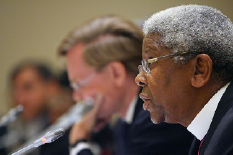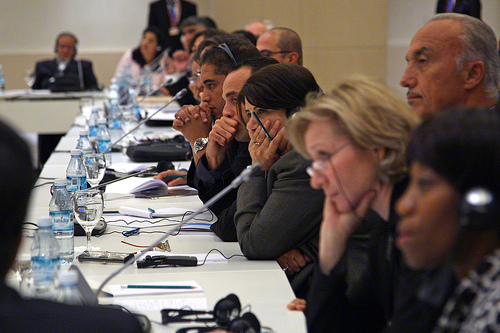
October 2, 2009. World Bank President and IMF Managing Director met with CSO representatives. Archbishop Noungane of South Africa moderated the townhall meeting.
The IMF and Civil Society
Civil Society Engagement at the 2009 Annual Meetings
October 20, 2009
Over 700 CSO representatives from 150 countries participated at the Civil Society Policy Forum of the 2009 World Bank and IMF Annual Meetings held in Istanbul, Turkey.
This year’s meetings attracted strong civil society participation, with over 700 representatives from civil society organizations (CSOs) representing 150 countries, including Europe, the US, Middle East, Central Asia, and Africa. As part of their ongoing outreach, the IMF and the World Bank interacted with CSOs and discussed a range of topics related to the work of the two institutions.
Formal sessions during the meetings were organized under the platform of the Civil Society Policy Forum where over 50 policy dialogue sessions (organized either by the Fund, the Bank or CSOs) were held over five days. These sessions addressed Fund-specific topics such as IMF Governance reforms, impact of the financial crisis on low-income countries, crisis in emerging Europe, the IMF’s role in the global financial crisis, and the G-20. CSO representatives were mainly focused on the global financial crisis, as well as assessments of the IMF role in the economic crisis. CSOs also discussed what more should be done to help low-income countries respond to the crisis.
IMF Sessions
The main event of the Forum was the IMF’s session on governance reform. IMF Managing Director Dominique Strauss-Kahn, held a meeting with 14 CSOs representatives from around the world— the final step of a process that has come to be known as the Fourth Pillar. The gathering was the culmination of a five-month consultation marked by unprecedented Fund cooperation with CSOs to prepare a report on governance.
This session was followed by a townhall meeting hosted by the IMF Managing Director and the World Bank President. The townhall was moderated by Archbishop Njongo Ndungane, President of African Monitor. In his opening remarks, Strauss-Khan briefed CSOs on the ambitious work program that the G20 (and the Fund membership) have given the Fund to implement. This includes the scaling up of financial assistance and policy advice to low-income countries to help them deal with the impact of the financial crisis as well as shift in IMF quota shares towards dynamic emerging markets and developing nations by at least 5 percent, from over-represented to underepresented countries.
Antoinette Sayeh, Director, African Department, and Hugh Bredenkamp, Deputy Director, Strategy, Policy, and Review Department, presented the Regional Economic Outlook for sub-Saharan Africa, including the IMF’s assessment of the continued impact of the financial crisis on Africa and the Fund's response in terms of policy advice, scaling up financial assistance, and innovative program design. Marek Belka, Director of the European Department, also spoke about the impact of the crisis on emerging Europe and how the affected countries were taking steps (with help of the international community, including the IMF), to address the challenges.
CSO sessions
IMF staff also participated in sessions organized by CSOs. Ranjit Teja, Deputy Director of the IMF’s Strategy, Policy, and Review Department took part in a session organized by the Heinrich Boll Foundation of Germany on "Dialogue with the IMF: How is the IMF Measuring Up to its Promises of Reform". The session featured Jomo K.S., UN Assistant Secretary-General for Economic Development, Nuria Molina of Eurodad, and Prof. Erinc Yeldan of the University of Bilkent in Ankara.
Much of the session centered on critiques of the international economic and financial system, as well as assessments of the IMF’s role in the global economic crisis. Jomo made the case that the IMF failed to predict the crisis or mitigate its impact. Molina asserted that recent IMF reforms--particularly in low-income countries had failed to deliver significant change. Teja responded by acknowledging Fund shortcomings in terms of anticipating the crisis, but argued that there had been significant changes in the design of new Fund-supported programs (both emerging market and low-income countries) that were yielding positive results. He drew his arguments from the recently published papers on Fund programs in these two regions.
Caroline Atkinson, Director of the IMF’s External Relations Department took part in another session organized by Oxfam, Action Aid, Bretton Woods Project, and the Third World Network. The session featured Joseph Stiglitz (Professor, Columbia University and Chairman of the UN Commission on the Financial Crisis), Sedat Bayar (Professor, Kadir Has University / Turkey), Andrew Kumbatira (Malawi Economic Justice Network), Bhumika Muchhala (Third World Network), and Bernice Romero (Advocacy Director, Oxfam International).
Professor Stiglitz pointed to the shortcomings of the Fund's work in crisis prevention, but he also argued that there had been significant change in the way the Fund had responded to the current global financial crisis. He said that changes put in place by the Managing Director Dominique Strauss-Khan and the staff level had enabled the Fund to change direction and respond appropriately to the crisis. Kumbatira asserted that the IMF’s recent lending to Malawi under its Exogenous Shocks Facility Arrangement had helped the country cope with the impact of worsening trade shocks in a manner that allowed for increased spending in key sectors. He noted that this assistance came with no conditionality.
CSO speakers argued for increased spending in low-income countries by adopting counter-cyclical policies. Atkinson explained to the audience that the crisis was not over and the stakes are particularly high for low-income countries. She added that the Fund had scaled up its assistance to low-income countries to deal with the twin shocks of the global financial crisis and last year’s surge in food and fuel prices and acknowledged that much more needs to be done. Atkinson welcomed an open dialogue with all CSOs interested in engaging with the Fund and in discussing the design and implementation of economic policies in countries. 
October 2, 2009. CSO representatives listening to the conversation at the CSO townhall meeting with the President of the World Bank and the IMF Managing Director.

IMF’s African Department Director Antoinette Sayeh (C) along with the IMF 's External Relations Department Division Chief, Vasuki Shastry (L) and the IMF 's Strategy Policy and Review Departments Deputy Director, Hugh Bredenkamp (R), speak during the CSO Policy Forum session "Global Financial Crisis and its Impact on Africa" at the Istanbul Congress Center on October 3, 2009. IMF Staff Photo/Thomas Dooley
